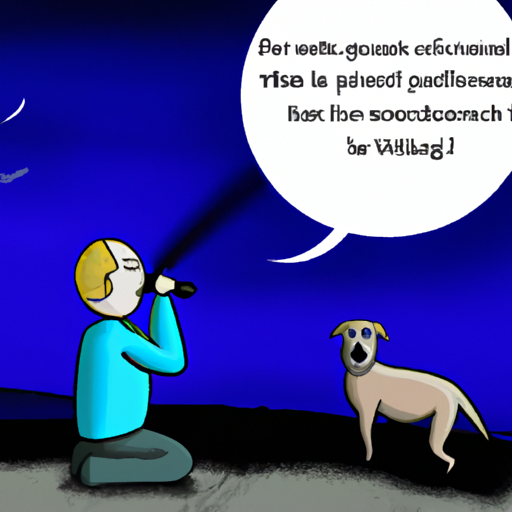As a pet parent, you may find it challenging when your dog won’t stop barking at night. This can be both a nuisance and a cause for concern as it might be a sign of an underlying issue. Let’s explore this issue in detail and find ways to alleviate it.
1. Understanding Why Dogs Bark at Night
Dogs communicate through barking, but excessive barking at night may indicate various issues:
- Loneliness: Dogs are social animals and may bark because they feel lonely.
- Fear or Anxiety: Dogs might bark at night due to fear or anxiety caused by noise, changes in the environment, or separation anxiety.
- Physical needs: Hunger, thirst, or the need to go to the bathroom may also cause dogs to bark at night.
2. Addressing the Causes of Night Barking
To address the issue, you need to determine the cause:
- Boredom or Loneliness: Ensure your dog has plenty of playtime and attention during the day.
- Fear or Anxiety: Provide a safe and comfortable space for your dog. Consider using white noise or soothing dog music to help them relax.
- Physical Needs: Ensure your dog is well-fed and has access to water. Keep a consistent schedule for bathroom breaks.
3. Training Your Dog to Stop Barking at Night
Training is a great way to manage your dog’s nighttime barking:
- Consistency: Use consistent commands to help your dog understand what you want.
- Positive Reinforcement: Reward your dog when they stop barking on command. Treats, praise, or toys work well.
- Avoid Punishment: Punishing your dog will only make them more anxious. Instead, focus on positive reinforcement.
4. Consulting with a Veterinarian or Dog Trainer
If your dog continues to bark excessively at night, it might be time to consult a professional. A veterinarian can rule out any medical issues, while a dog trainer can provide more specialized training techniques.
5. Using Products to Help Control Barking
There are products available that can help control your dog’s barking:
- Bark Collars: These collars emit a harmless spray or vibration to deter barking.
- Dog Calming Products: These products, like diffusers, sprays or chewables, can help soothe anxious dogs.
- Interactive Toys: Toys can keep your dog entertained and reduce their need to bark.
6. Preparing Your Home for a Quiet Night
Preparing your home can also help reduce your dog’s nighttime barking:
- Create a Comfortable Sleeping Area: This can help your dog feel secure and relaxed.
- Reduce Noise and Light: Use curtains and white noise machines to create a calm environment.
- Keep a Consistent Bedtime: A consistent schedule can help your dog understand when it’s time to sleep.
7. Understanding That Barking is Natural
Remember that barking is a natural behavior for dogs. It’s their way of communicating with you. Your goal should be to manage excessive barking, not to stop your dog from barking entirely.
8. Frequently Asked Questions
Q: When should I consult a professional about my dog’s barking?
A: If your dog’s barking is causing a significant disturbance or if you suspect an underlying medical issue, it’s best to consult a professional.
Q: Can I use a bark collar on my puppy?
A: It’s best to consult your vet before using a bark collar on a puppy. They can advise you based on your puppy’s size, breed, and health.
Q: How long does it take to train a dog to stop barking at night?
A: The training duration can vary depending on the dog and the cause of the barking. Consistency is key, and positive changes are usually seen within a few weeks.
Understanding and addressing your dog’s nighttime barking can lead to more peaceful nights for both you and your pet. Remember, patience and consistency are key. Good luck!



